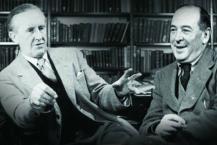 A Hobbit, a Wardrobe, and a Great War. What a great title. And what a great book. Joseph Loconte, professor of history at the King’s College in New York City, has crafted a masterpiece that weaves knowledge of the impact of WWI on a generation, and then offers an insightful analysis of how the war affected the thinking and writing of both C. S. Lewis and J. R. R. Tolkien.
A Hobbit, a Wardrobe, and a Great War. What a great title. And what a great book. Joseph Loconte, professor of history at the King’s College in New York City, has crafted a masterpiece that weaves knowledge of the impact of WWI on a generation, and then offers an insightful analysis of how the war affected the thinking and writing of both C. S. Lewis and J. R. R. Tolkien.
For me, as a professional historian, the book was a delight on two fronts.
First, WWI has not been a particular focus of my studies. Yes, I know the basics, but I’ve never delved into the kind of detail Loconte provides here. So this book has deepened my bond with the generation that endured that horror.
Second, even though I knew that Lewis and Tolkien had served in the Great War (as it was called at the time), and I am familiar with Lewis’s account in Surprised By Joy, Loconte’s description of what he experienced expands on the barebones treatment Lewis gives. As for Tolkien, this was my first encounter with what he suffered during the war.
Tolkien was a faithful Catholic at the time, and remained so for the rest of his life. Lewis was an atheist, sometimes bordering on agnosticism. They didn’t know each other while the war was going on, but when they met at Oxford for the first time in 1926, their shared experience, not only of literature, but of the war as well, created a deep friendship.
 Loconte shows how this Great War dashed the utopian hopes of Progress in the 1920s generation and replaced those hopes with cynicism. Then he concentrates on how Lewis and Tolkien bucked that trend in their writing. Once Lewis converted to the faith (helped along by key conversations with Tolkien), he became the most noted Christian apologist of his time.
Loconte shows how this Great War dashed the utopian hopes of Progress in the 1920s generation and replaced those hopes with cynicism. Then he concentrates on how Lewis and Tolkien bucked that trend in their writing. Once Lewis converted to the faith (helped along by key conversations with Tolkien), he became the most noted Christian apologist of his time.
Lewis’s works—from the Screwtape Letters to his science fiction novels to The Chronicles of Narnia—recognized evil for what it was, yet always offered the Christian remedy for that evil. Tolkien’s The Lord of the Rings painted a horrible portrait of evil, and the descriptions he offers of the terrible battles derived directly from his WWI experiences. Lewis drew on that same background for his works.
A Hobbit, a Wardrobe, and a Great War is eminently readable. I breezed through it in less than three days. As the cliché goes, I couldn’t put it down. My next goal is to figure out how to use it in one of my courses because it is that good.
This is not a book for Lewis and Tolkien admirers only. It is for anyone who seeks to understand the false hopes humanity tends to cling to, the awfulness of human evil, and the way in which Christians can communicate the truths of the Good News to any “lost generation.”
The current generation is just as lost as the one Lewis and Tolkien addressed; the solution to that lostness has not changed. God’s truth is still the message that must be trumpeted to a world that has exchanged the truth for a lie.
